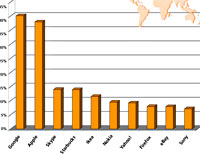 According to an online survey conducted by brand-meisters Brandchannel.com, Google has held on to its title as the world’s most influential brand in 2005, pushing Apple out of the numero uno spot for the second time this decade.
According to an online survey conducted by brand-meisters Brandchannel.com, Google has held on to its title as the world’s most influential brand in 2005, pushing Apple out of the numero uno spot for the second time this decade.
In the super-skinny frapuccinno-fuelled world of marketing and advertising, effective branding is the key to global recognition and soaring sales, and Brandchannel’s poll looks to big up the branding big boys.
Global top five brands Globally, top honours went to Google, who outflanked brand rivals Apple with an avalanche of punter-pleasing freebies like Google Mini, Desktop and Google Earth, described by Brandreport as, “arguably the greatest thing to hit the Internet since porn” (steady on, chaps!).
Globally, top honours went to Google, who outflanked brand rivals Apple with an avalanche of punter-pleasing freebies like Google Mini, Desktop and Google Earth, described by Brandreport as, “arguably the greatest thing to hit the Internet since porn” (steady on, chaps!).
Hot on their heels was Apple who notched up an impressive 2005, with the iPod shuffle, iPod nano, iPod video, Mac mini, and Tiger operating system rolling out over a busy year.
Joining the two technology heavyweights in the global top five were the newly arrived VoIP hotshots Skype, followed by Starbucks and Ikea.
Europe & Africa
In Europe and Africa, Nordic mobile technology kings Nokia reclaimed their number one slot, while Ikea stayed in second place for the fourth year in a row.
Once again, Skype rung up a new addition to the list, jumping sprightly into third place above Spanish clothing retailers Zara and car manufacturer BMW.
US & Canada Although Google whipped Apple globally, the company still rules the roost on their home turf, with Steve Jobs’ outfit being declared the leading brand in North America in front of their rivals.
Although Google whipped Apple globally, the company still rules the roost on their home turf, with Steve Jobs’ outfit being declared the leading brand in North America in front of their rivals.
The omnipresent coffee-shifters Starbucks brewed up a third place slot, while national retailer Target boxed up a well earned fourth place.
The cancer defying, uber-athlete Lance Armstrong pedalled his way into an unexpected fifth place, with the growing popularity of the classifieds site craigslist reflected by a sixth place listing above Coca Cola (8th) and Amazon.com (10th).
Asia Pacific
Sony continues to dominate the Asian Pacific market, hogging the number one position for the fourth time in just five years.
Toyota motor up to second place, while the ever ambitious Samsung find themselves slipping down to third place, above electronics giants LG (4th) and the multinational bank HSBC (5th).
Central & Latin America It’s a story of booze and beer in the central & Latin America segment, with Corona and Bacardi sitting proud in first and second places respectively.
It’s a story of booze and beer in the central & Latin America segment, with Corona and Bacardi sitting proud in first and second places respectively.
Movistar, the mobile phone operator owned by Telefónica, dials up a third place, with Rubber sandal maker Havaianas treading into fourth place above the Mexican cement manufacturer Cemex.
Over 2,500 people from 99 countries voted in the Brandchannel poll, with the company insisting that voters “should not be dismissed as a bunch of hyper-caffeinated gearheads”, claiming that their polls “identify brands that the mainstream world eventually catches up with.”
 Digital-Lifestyles has been informed, and can exclusively reveal, that BT is looking to shed its OU operations from its Media and Broadcast (BT M&B) division.
Digital-Lifestyles has been informed, and can exclusively reveal, that BT is looking to shed its OU operations from its Media and Broadcast (BT M&B) division. Despite BT as a whole being determined to move into new revenue opportunities like TV, there’s new breed of technology solutions for linking signals which are outside BT’s control. This bothersome issue is further squeezing their previously healthy profits, and the current cost base for BT’s OU services makes it difficult to justify continued operations, indeed we’ve been told that the OU is currently unprofitable. It’s hoped that a buyer will be able to make the operations pay, by reducing costs and realising synergies.
Despite BT as a whole being determined to move into new revenue opportunities like TV, there’s new breed of technology solutions for linking signals which are outside BT’s control. This bothersome issue is further squeezing their previously healthy profits, and the current cost base for BT’s OU services makes it difficult to justify continued operations, indeed we’ve been told that the OU is currently unprofitable. It’s hoped that a buyer will be able to make the operations pay, by reducing costs and realising synergies. Further deals for incumbent European telecoms operators are on the cards as they retreat into their core businesses. See France Telecom, who recently off-loaded one of its Paris Earth Stations to the satellite operator
Further deals for incumbent European telecoms operators are on the cards as they retreat into their core businesses. See France Telecom, who recently off-loaded one of its Paris Earth Stations to the satellite operator  So where do we start?
So where do we start? Naturally, there will always be those who say regulatory decisions made by organisations such as Ofcom are ‘independent’ and ‘evidence-based’ and therefore would be valid whoever happened to be in government. However, most people know Ofcom is ultimately a product of the government who created its remit – New Labour – and who on occasion have allowed the notion of ‘evidence-based’ regulation to underpin a culture of third party ‘experts’ who decide policy matters with a minimum of public participation or scrutiny.
Naturally, there will always be those who say regulatory decisions made by organisations such as Ofcom are ‘independent’ and ‘evidence-based’ and therefore would be valid whoever happened to be in government. However, most people know Ofcom is ultimately a product of the government who created its remit – New Labour – and who on occasion have allowed the notion of ‘evidence-based’ regulation to underpin a culture of third party ‘experts’ who decide policy matters with a minimum of public participation or scrutiny. If you were to consider UK telecoms, media, and technology (TMT) policy since Parliament passed the Communications Act 2003 and brought about the formation of Ofcom much has happened. The regulatory machinery of the state has swung into action with relative efficiency, taking on such issues as BT’s marketplace position, digital switchover, and public subsidy and control of broadcasting and new media. And we are starting – just starting – to see the results of some those efforts.
If you were to consider UK telecoms, media, and technology (TMT) policy since Parliament passed the Communications Act 2003 and brought about the formation of Ofcom much has happened. The regulatory machinery of the state has swung into action with relative efficiency, taking on such issues as BT’s marketplace position, digital switchover, and public subsidy and control of broadcasting and new media. And we are starting – just starting – to see the results of some those efforts. Certainly the party is already developing new ideas (or in some cases adopting the opposition’s cast-offs) in other policy areas. And by all accounts, David Cameron is doing an effective job of moving the Tories back toward the centre of British politics. The new leader appears flexible and open to new policy approaches. But nothing definite is happening in the TMT space. We think it should.
Certainly the party is already developing new ideas (or in some cases adopting the opposition’s cast-offs) in other policy areas. And by all accounts, David Cameron is doing an effective job of moving the Tories back toward the centre of British politics. The new leader appears flexible and open to new policy approaches. But nothing definite is happening in the TMT space. We think it should. In its submission this week to an MPs’ inquiry into Digital Rights Management (DRM), the influential National Consumer Council (NCC) spelt out its concern at current self-regulation, and called for new laws to ensure consumers’ rights to use digital content are protected.
In its submission this week to an MPs’ inquiry into Digital Rights Management (DRM), the influential National Consumer Council (NCC) spelt out its concern at current self-regulation, and called for new laws to ensure consumers’ rights to use digital content are protected. People are finding they can’t play the DVDs they’ve bought abroad or make compilations of material that they have purchased for their own use. The NCC believes that the use of DRM can and is already constraining the legitimate consumer use of digital content. It is also undermining consumers existing rights under consumer protection and data protection laws.
People are finding they can’t play the DVDs they’ve bought abroad or make compilations of material that they have purchased for their own use. The NCC believes that the use of DRM can and is already constraining the legitimate consumer use of digital content. It is also undermining consumers existing rights under consumer protection and data protection laws. Jill Johnstone, Director of Policy at NCC said; “Because of the current situation, consumers face security risks to their equipment, limitations on their use of products, poor information when purchasing products and unfair contract terms.
Jill Johnstone, Director of Policy at NCC said; “Because of the current situation, consumers face security risks to their equipment, limitations on their use of products, poor information when purchasing products and unfair contract terms. The buzz about the rebirth of the Internet has been getting louder for at least the last nine months as the label Web 2.0 was attached to the new generation of applications.
The buzz about the rebirth of the Internet has been getting louder for at least the last nine months as the label Web 2.0 was attached to the new generation of applications. It’s based on the Open-source software principles that are integral to true Web 2.0 apps – by giving away the application and providing tools for interested developers, a large community has grown up providing plug-ins that extend WordPress in many different directions. This benefits the users as well as the people behind WordPress – see how giving things away is a good thing?
It’s based on the Open-source software principles that are integral to true Web 2.0 apps – by giving away the application and providing tools for interested developers, a large community has grown up providing plug-ins that extend WordPress in many different directions. This benefits the users as well as the people behind WordPress – see how giving things away is a good thing? A new UK survey shows a dramatic increase in the use of picture messaging with WAP also growing in popularity.
A new UK survey shows a dramatic increase in the use of picture messaging with WAP also growing in popularity. When it comes to seeking mobile information online, it’s the geezers who are keenest to get their keypads rattling, with 38% accessing mobile Internet (WAP) sites compared to 26% of ladies.
When it comes to seeking mobile information online, it’s the geezers who are keenest to get their keypads rattling, with 38% accessing mobile Internet (WAP) sites compared to 26% of ladies. Elsewhere, the Mobile Data Association have calculated that WAP page impressions are now approaching the 2 billion per month mark, with the Mobile Media Monitor revealing the most popular types of site on the mobile internet.
Elsewhere, the Mobile Data Association have calculated that WAP page impressions are now approaching the 2 billion per month mark, with the Mobile Media Monitor revealing the most popular types of site on the mobile internet. Slapping iTunes around the face with their hefty gauntlet, Google have laid down a challenge to iTunes with the announcement of their new video and television Internet service, the Google Video Store.
Slapping iTunes around the face with their hefty gauntlet, Google have laid down a challenge to iTunes with the announcement of their new video and television Internet service, the Google Video Store. The service promises to “democratise” video sales, letting wannabe Spielbergs sell their movies on Google Video Store, with Google taking what Larry Page has described as a “very low” percentage of the sale cost.
The service promises to “democratise” video sales, letting wannabe Spielbergs sell their movies on Google Video Store, with Google taking what Larry Page has described as a “very low” percentage of the sale cost. Visitors to the Google Video homepage at
Visitors to the Google Video homepage at